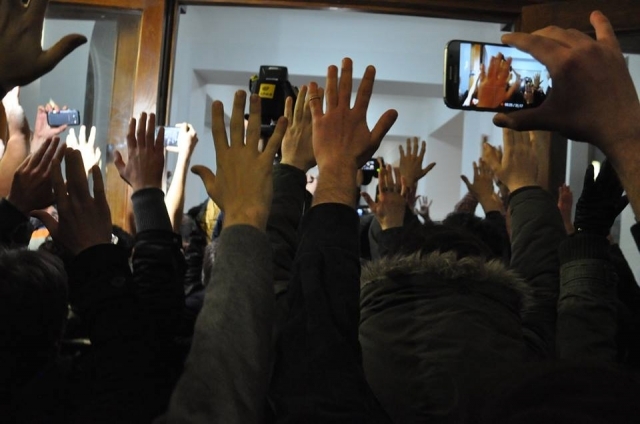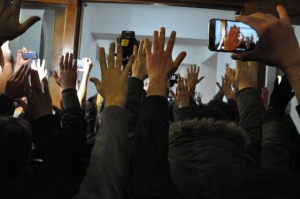TSU Student Protest Leads to Broader Movement
Central government involvement, lack of financial transparency and democratic governance at Tbilisi State University (TSU) caused thousands of students to rail against the Rector and the main government body of the institution.
Students split into two; the student self-government and the independent union of students entitled Auditorium 115 (according to the number of the room they are based in). Each occupied TSU’s major campus on Chavchavadze Ave., leading to a cessation of all studying processes from the beginning of March.
The self-government students demanded the resignation of TSU Rector, Vladimer Papava, while Auditorium 115 requested reforms inside the self-government system as well as an investigation into the presence of intelligence officers within the university.
The protestors also demanded that TSU’s authorities be held accountable for the student government’s actions and a cap be put in place on all future expenditures made by the university’s elected bodies.
Self-government members Tuesday rushed into the Rector’s office and occuped it for a time. President of the self-government, Shalva Sabauri, announced that if the Rector did not take control of the situation, they would not allow him to enter his office. Sabauri also warned of a possible hunger strike if their demands were not be honored.
“This is not a revolution - this is evolution,” said one of the students.
Wednesday night, both parties, professors and representatives of the University, and the public assembled on TV company Rustavi 2’s Talk-Show Archevani (The Choice), to hold a public debate on the matter.
Both student bodies affirmed that even though they are demonized and labeled as staunchly opposed to each other, they actually aspire toward a shared goal: reforming the mother university of Georgia and enabling students to receive a quality education.
“Speculations are in place that some personalities are attempting to play mediator between us, though we are not divergent parties,” Shalva Sabauri said.
Meanwhile, another part of Auditorium 115, led by TSU graduate student Levan Lortkipanidze, was announcing plans to establish a Movement which will not only focus on their own institution, but will also be part of broader educational reforms throughout Georgia.
“Our Movement will become part of major changes in the Georgian education system,” Lortkipanidze declared. He added that those changes will be made possible through a Reforms Council, which they also will set up.
Following Lortkipanidze’s statement, a member of the Academic Council left her position. Tamar Gersamia stated that after stepping back from her official responsibilities, she is planning to join the students and help the education process as an ordinary professor.
Sergi Kapanadze, ex-Deputy Foreign Minister of Georgia, who served as a Dean of TSU’s School of Social and Political Sciences (2012) also attended the Wednesday night discussion. Kapanadze spoke of an urgent need for major reforms at the university, as the existing bureaucracy and lack of transparency seriously hinders the normal functioning of TSU.
Following the tensions at the University, Georgia’s Prime Minister Giorgi Kvirikashvili announced that he is closely following the developments. He said both the university and the education system in Georgia are in need of fundamental reforms.
Education Minister Tamar Sanikidze said she is not going to get involved in solving internal problems at the university, as it is the responsibility of University’s Academician Council and it is necessary to create a working atmosphere in order to solve the dispute.
The university’s Academic Council has requested a reasonable time to discuss the matter of the rector’s resignation or a solution to the problem.
Protests originally broke out on March 7th, when several hundred attendees at Georgia’s top university launched a rally against the institute’s alleged corrupt spending policies, including the provision of funds to privileged student government members.
According to Kakha Khitarishvili, a TSU student, the student government took a ski trip to Bakuriani this winter on the university’s tab, at a cost of 24,500 GEL. Kakha said, “I pay 2000 GEL per year to study here, I don’t want this money going toward people taking ski trips.”
Nepotism within faculty hiring has also been highlighted. Auditorium 115 claimed that, because of the central government’s influence on the university, they are able to set former colleagues and friends up with teaching and administration jobs.
The self-government and Auditorium 115 have already agreed on their willingness to work in a coordinated manner and launch a fresh process of activities. The study process at TSU resumed from Thursday.
By Zviad Adzinbaia
Photo: Mariam Nikuradze/DFWatch












